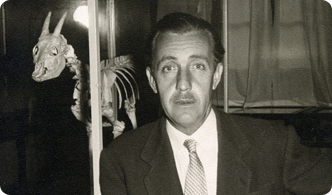At the present time, these archives are in the library of the ICP.
This documentary material is of great value because it gathers together underlying scientific activity that draws the profiles of the history of Catalan contemporary science and, particularly, of the geosciences, incarnated in the person of Miquel Crusafont and his colleagues of the Provincial Institute of Paleontology of Sabadell (IPPS), which is today known as the Institut Català de Paleontologia Miquel Crusafont.

In addition, the archives have a great social component, since they reflect Catalan and Spanish political life and their repercussions in the intellectual and personal surroundings of their protagonists and their roots in institutions like the IPPS.
Before initiating the cataloguing process, the Crusafont archives were comprised of more than a hundred boxes containing various documents such as personal, professional and academic documents, congresses, short courses, conferences, publications, books, almost six thousand photographs, press clippings, post cards and, primarily correspondence.
The epistolary legacy

Indeed, the scientific correspondence of Crusafont with other eminent scientists was fundamental for the development of his scientific work and constitutes proof of his international reach; but it is also a sample of the personal touch that Crusafont knew how to maintain with scientists from around the world. Today, this correspondence constitutes very important historiographic material for learning about the development of Catalan paleontology and geology, but also talks about what basically took place from Sabadell to Barcelona.
There are many foreign scientists with whom Crusafont maintained contact.Perhaps the most important was the North American professor George Gaylord Simpson, the most noted neo-Darwinian theoretician of that time. Crusafont had a close friendship with him that made it possible for this illustrious professor to come to Sabadell in 1960.
In this list there are researchers from Europe, Asia, and South America. There also Catalan residents in Spain and others who were lived outside of Catalonia because of professional reasons or exile due to the Franco regime. Many of these contacts were established personally in the International Short courses of Paleontology of Sabadell that Crusafont organized between 1952 and 1958 at the Museum of Sabadell and that had a great deal of prestige.
Another important part of the archives is the result of the exchange of information between paleontologists on the findings that occurred. This exchange was carried out by means of small publications, sometimes with only a couple of pages, commonly known as 'files'. Miquel Crusafont wrote almost five hundred of these types of publications over the course of his life.
The cataloguing
The project of cataloguing the archives was developed starting in June 2005, through an agreement between the Institut Català de Paleontologia Miquel Crusafont and the Universitat Autònoma de Barcelona (Service of Archives of Science Projects, SAC). The result constitutes a tool that allows it to be used for loaning the documents and thus to facilitate access to the knowledge and information that it contains. In other words, to spread this information and to offer it to the users who need it.
At the beginning of 2008, 8,500 personal and professional correspondence documents had already been opened. These were comprised mainly of letters, post cards, receipts, invoices, telegrams, carols, cards, notes and invitations.
An important part of this information is on the website of the project arxiusdeciencia.cat (www.sac.cat) of the Centre d'Estudis d'Història de les Ciències de la Universitat Autònoma of Barcelona.









